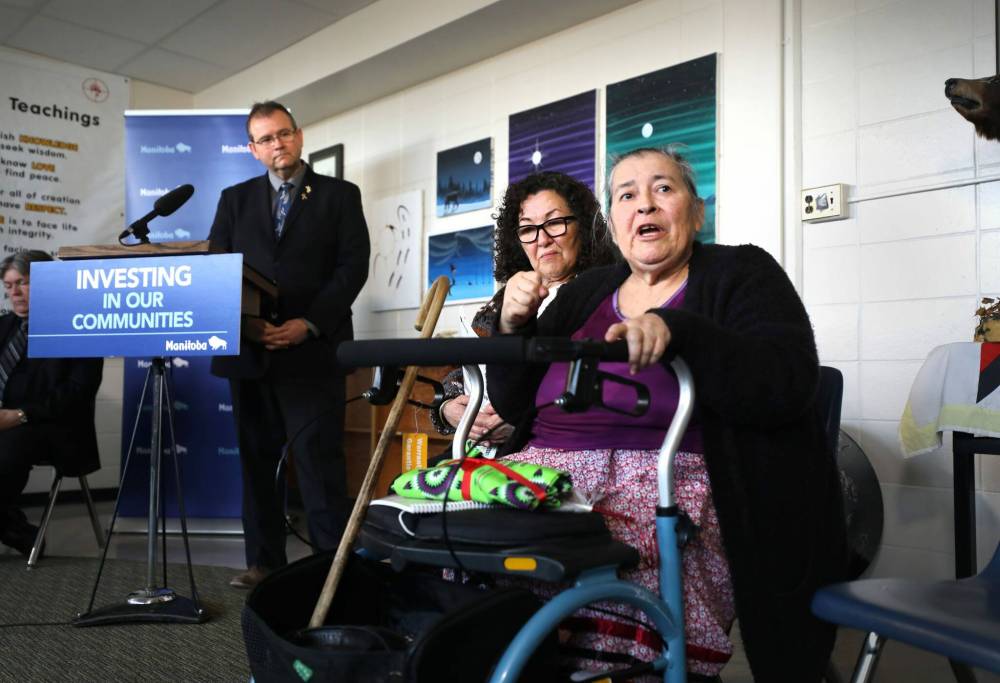Manitoba launches Indigenous education framework
Advertisement
Read this article for free:
or
Already have an account? Log in here »
To continue reading, please subscribe:
Monthly Digital Subscription
$1 per week for 24 weeks*
- Enjoy unlimited reading on winnipegfreepress.com
- Read the E-Edition, our digital replica newspaper
- Access News Break, our award-winning app
- Play interactive puzzles
*Billed as $4.00 plus GST every four weeks. After 24 weeks, price increases to the regular rate of $19.95 plus GST every four weeks. Offer available to new and qualified returning subscribers only. Cancel any time.
Monthly Digital Subscription
$4.99/week*
- Enjoy unlimited reading on winnipegfreepress.com
- Read the E-Edition, our digital replica newspaper
- Access News Break, our award-winning app
- Play interactive puzzles
*Billed as $19.95 plus GST every four weeks. Cancel any time.
To continue reading, please subscribe:
Add Free Press access to your Brandon Sun subscription for only an additional
$1 for the first 4 weeks*
*Your next subscription payment will increase by $1.00 and you will be charged $16.99 plus GST for four weeks. After four weeks, your payment will increase to $23.99 plus GST every four weeks.
Read unlimited articles for free today:
or
Already have an account? Log in here »
Hey there, time traveller!
This article was published 28/04/2022 (1404 days ago), so information in it may no longer be current.
Forget textbooks — a growing number of students and teachers in Manitoba are learning about the histories, cultures and contemporary lifestyles of First Nations, Métis and Inuit people directly from elders and knowledge keepers.
Manitoba has earmarked $1.6 million to expand an initiative that has seen elders partner with school divisions throughout early 2022 to share teachings on traditional knowledge systems.
“This initiative supports respectful and relational engagement with elders and knowledge keepers to embed Indigenous worldviews across curricula, instruction, assessment and within mental health and well-being programming,” said Education Minister Wayne Ewasko, as he announced the above expansion and launch of a new provincial policy directive Thursday.

During an event at Niji Mahkwa School in Winnipeg, Ewasko told reporters his department’s latest initiatives respond to the Truth and Reconciliation Commission of Canada’s calls to action that identify education as a key part of the reconciliation.
“Mamahtawisiwin: the Wonder We are Born With” — a policy directive and conceptual framework for Indigenous education — aims to support the holistic achievements of all First Nations, Métis and Inuit students by supporting Manitoba teachers in incorporating Indigenous pedagogy, languages and culture into their teaching and practices.
“Indigenous pedagogy is good pedagogy,” said teacher Angela Fey, co-chairwoman of the Indigenous Inclusion Directorate Advisory Council, a group that provides ongoing advice to the education department.
“And Indigenous ways of knowing, being and doing benefit everyone.”
The mamahtawisiwin framework is guided by principles emphasizing Indigenous worldviews and values, mutual understanding about the rights of Indigenous peoples, respect for diversity, shared accountability and responsibility, and the importance of using equity and student-focused lenses in the K-12 education system.
The Inninew (Cree) phrase nods to a teaching that means people are born with big hearts and their role is to help others. The name was gifted to the province by an elder in northern Manitoba.
The 73-page document underpins Manitoba Education’s new action plan, which was unveiled last week as the government’s revised road map to reform public schooling in response to the 75 recommendations in the K-12 commission’s 2020 report.
(The action plan replaces the Better Education Starts Today strategy, a document that supported the widely controversial and now-defunct Bill 64.)
It was developed with input from knowledge keepers, students, teachers, superintendents, post-secondary institutes, early childhood educators and community partners.
Myra Laramee, an elder in the Winnipeg School Division, offered a prayer before the news conference Thursday. Laramee later spoke about the importance of teaching students about mother earth being a living entity that must be protected.
“We have some good footprints to make and I believe that that’s going to happen. The children in this school are going to wake up with their children knowing those seven teachings (respect, courage, humility, love, wisdom, honesty and truth),” she said.
A total of 33 schools across 11 divisions were part of the initial knowledge keeper pilot program earlier this year.
High schoolers from Niverville have built relationships with leaders from Roseau River Anishinabe First Nation and Dauphin middle schoolers have taken part in a community pow wow with an elder from Ebb and Flow First Nation, among other projects.
The minister of Indigenous reconciliation and northern affairs touted the announcement Thursday.
Alan Lagimodiere said the initiatives respond to calls to action to improve education attainment among Indigenous youth, develop culturally appropriate curriculum, protect the right to Indigenous languages and enable parents to participate fully in the education of their children.
maggie.macintosh@freepress.mb.ca
Twitter: @macintoshmaggie

Maggie Macintosh
Education reporter
Maggie Macintosh reports on education for the Free Press. Originally from Hamilton, Ont., she first reported for the Free Press in 2017. Read more about Maggie.
Funding for the Free Press education reporter comes from the Government of Canada through the Local Journalism Initiative.
Every piece of reporting Maggie produces is reviewed by an editing team before it is posted online or published in print — part of the Free Press‘s tradition, since 1872, of producing reliable independent journalism. Read more about Free Press’s history and mandate, and learn how our newsroom operates.
Our newsroom depends on a growing audience of readers to power our journalism. If you are not a paid reader, please consider becoming a subscriber.
Our newsroom depends on its audience of readers to power our journalism. Thank you for your support.

